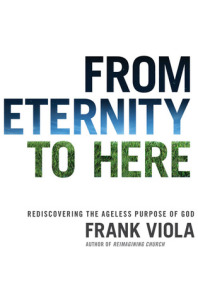Frank Viola: From Eternity to Here
A Review and Reflection by Dony Donev.
 Frank Viola, From Eternity to Here: Rediscovering the Ageless Purpose of God (David C. Cook, 2009), 320 pages, ISBN 9781434768704.
Frank Viola, From Eternity to Here: Rediscovering the Ageless Purpose of God (David C. Cook, 2009), 320 pages, ISBN 9781434768704.
In times of postmodernism, when metanarratives, and especially Biblical metanarratives, are being deconstructed and questioned by just about every secular movement, there has been a consistent attempt to explain the story of the Bible again to a postmodern and unchurched generation in a way they would actually understand.
To begin with the obvious, the book is comprised of three familiar narratives that have already been openly discussed: the Bride of Christ, the House of God, and finally the Body of Christ and the Family of God. The careful reader immediately notices that all three of these narratives are framed with the language of family. The story of the first family in Genesis, is not merely the fall of Adam and Eve, but how the whole creation is God’s very plan for redemption of the universe and the salvation of mankind. This perspective changes the understood purpose of the Gospel from being preoccupied with the fall of humankind to God-centered Missio Dei.
From Eternity to Here resembles the expository apologetic style of Augustine in De Civitate Dei. But instead of being philosophical, what we have here is much more a narrative, very similar to the approach taken by St. Symeon the New Theologian.
The view of God’s love being presented is similar to the way Karl Barth treats it in his commentary to the Romans. Perhaps this is because Viola sees it from his own experience of knowing God which tries to see it from God’s own perspective through God’s grace. When speaking of the ultimate purpose of God for mankind and the universe, Viola, almost like Barth, walks on the edges of universalism. While it is true that God draws the creation to Himself through His love, a careful theologian would make their audience aware of the danger of universalism, unless they believe such a soteriological view. So, I wrote Viola to ask if he subscribes to universalism and his response was that he did not. And it seems it would be quite difficult for him to be a Universalist, because of what he believes about the reality of Hell.
The three discourses of the book have been much discussed since its publication, yet a few observations are in order. Part one represents an ageless romance of a transcendent and eternal God who creates His bride and reconciles the entire creation with Himself in order to redeem her back to His love. It is a passion that passes through space and time like no other.
The second narrative shows God on a mission. And while the Creator is described as “homeless” and searching for a home within His own creation, His mission is only completed in making mankind His home. Thus, the creation searches with God and a deserted and wildered mankind is found by God and finds eternal rest in Him alone.
This introduces the third “new species” discourse that resolves the dilemma of one whole generation, reconciling the story of the Bible with a postmodern mindset. The union of Adam and Eve also puts a completely new perspective on the Biblical role of women and it makes an interesting case for their equal roles in creation and ministry.
Disappointment has been expressed in the unchurched language used in the book to describe God’s emotions, but what about a sermon preached in 1741 by Jonathan Edwards under the name “Sinners in the Hands of an Angry God”? Yet, a warning is indeed in order as the beginning of the 21st century is marked by a surge of postmodern apologetics through which Christian authors address issues outside the institutionalized church (social, political and economic) with the language of the people. But this attempt often goes so “deep undercover” that it remains foreign even to the church itself. A prime example for this phenomenon was the Purpose Driven Church, which being a powerful address to the unchurched, often remains a mystery to many mainline Christians who simply could not separate themselves from the known church language. Could we find a balanced way to present Biblical truths while keeping the language of the Bible itself?


